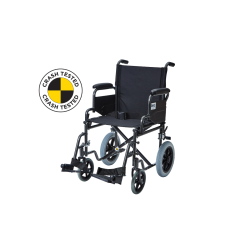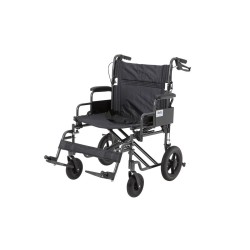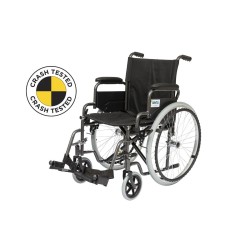Wheelchairs
There are 3 products.
Active filters
About Wheelchairs
Essential Mobility Solutions for Independence and Safe Transport
Wheelchairs provide fundamental mobility equipment enabling independence and safe transport for individuals with mobility limitations across hospitals, care homes, rehabilitation facilities, and community settings throughout England, Scotland, Wales, and Northern Ireland. These essential mobility aids encompass transit wheelchairs designed for attendant pushing, self-propelled wheelchairs enabling user control, lightweight folding models facilitating transport and storage, bariatric wheelchairs accommodating higher weight capacities, and specialist wheelchairs addressing specific clinical needs including pressure care or postural support requirements. Healthcare and social care environments rely on wheelchairs for supporting patients and residents with temporary or permanent mobility limitations, facilitating safe transfers between locations, enabling participation in activities and outings, preventing falls and injury amongst those unable to walk safely, and maintaining independence and dignity through appropriate mobility provision. Modern wheelchairs incorporate features including ergonomic designs promoting comfort during extended use, puncture-proof tyres reducing maintenance requirements, easy-folding mechanisms simplifying transport and storage, and varied accessories enabling customisation. The provision of appropriate wheelchairs supports person-centred care through mobility enabling independence, prevents social isolation by facilitating participation, and demonstrates commitment to disability inclusion across professional care environments.
The implementation of appropriate wheelchair provision directly supports CQC compliance through falls prevention, maintenance of independence, and demonstration of person-centred care addressing individual mobility needs. Individuals with mobility limitations lacking appropriate wheelchair access face serious challenges including falls risks when attempting to walk beyond safe capabilities, social isolation when mobility limitations prevent participation, loss of independence requiring assistance for all movement, and psychological distress from activity restriction. Wheelchairs address these challenges by providing safe mobility alternatives to unsafe walking, enabling participation in activities and social interactions, supporting independence through self-propulsion where possible, and maintaining dignity through appropriate equipment provision. Clinical applications include post-operative mobility enabling safe movement during recovery, stroke rehabilitation supporting mobility whilst function improves, progressive neurological conditions maintaining mobility as disease advances, temporary injury providing mobility during healing, and frailty management preventing falls whilst preserving activity. Care organisations benefit from reduced falls incidents when appropriate wheelchairs are provided, enhanced resident satisfaction through maintained independence and activity participation, and improved quality indicators through falls prevention and activity engagement. Modern wheelchairs incorporate features such as adjustable components accommodating individual needs, pressure-relieving cushions reducing injury risks, and attendant brakes enhancing safety throughout England, Scotland, Wales, and Northern Ireland.
Selecting and implementing wheelchairs requires individual assessment, appropriate equipment specification, and integration with mobility management strategies across healthcare and social care facilities throughout the UK. Organisations should conduct comprehensive assessments determining mobility limitations, user capabilities influencing self-propelled versus transit selection, environmental factors including where wheelchairs will be used, and clinical needs such as pressure care or postural support requirements. Equipment selection should consider user weight determining required capacity, seat dimensions ensuring appropriate fit, folding requirements facilitating transport and storage, and clinical features such as pressure-relieving cushions. Implementation protocols must encompass staff training on safe wheelchair use including pushing techniques preventing musculoskeletal injury, transfer procedures supporting safe movement to and from wheelchairs, and maintenance requirements ensuring continued safety. Quality assurance measures should include regular wheelchair checks ensuring mechanical safety and proper function, documented maintenance schedules, cleaning protocols preventing cross-contamination particularly for shared wheelchairs, and monitoring of wheelchair-related incidents. Modern wheelchairs incorporate features such as attendant-controlled brakes, anti-tip devices preventing backwards falls, and ergonomic push handles reducing staff injury risks. Organisations should establish wheelchair management systems tracking equipment allocation and maintenance, determine appropriate wheelchair-to-user ratios based on needs assessment, and implement procedures ensuring availability when required. Individual care plans should document wheelchair requirements, mobility capabilities, and any restrictions on independent use. Staff education should address recognition of inappropriate wheelchair use including incorrect sizing causing discomfort or pressure injuries, unsafe transfers risking falls, and deteriorating equipment requiring maintenance. By maintaining appropriate wheelchair fleets and implementing professional mobility management protocols, healthcare and social care organisations throughout England, Scotland, Wales, and Northern Ireland demonstrate their commitment to CQC standards, falls prevention through appropriate mobility provision, independence maintenance supporting quality of life, and inclusive care enabling full participation for all individuals regardless of mobility limitations across care environments.



